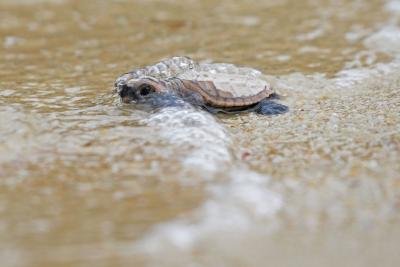Pilibhit (Uttar Pradesh), June 23 (IANS) The Turtle Survival Alliance (TSA), a US-based international organisation, is undertaking a fresh survey of turtle species in the Terai region of Uttar Pradesh.
The survey will be carried out after a gap of 15 years.
The diversity of turtles and status of their habitats are other crucial subjects that will be an integral part of the survey.
According to the India programme director of TSA, Dr Shailendra Singh, the survey has been planned in the Terai Arc Landscape (TAL) region. It was initiated in Bahraich district on June 15, with work in the Pilibhit Gangetic plains to begin soon.
“The survey will last a fortnight. Every survey team will comprise three experts – one each of turtle species, wetlands and socio-economic affairs,” said the TSA director.
He said that the reason for selecting Pilibhit as a survey destination was the presence of 13 species of turtles there, of which seven are enlisted in Schedule 1 of the Wildlife Protection Act of India.
The studies revealed that as many as 356 species of turtles and tortoises were present globally, of which 29 were present in the Indian wetlands.
“During the survey carried out in 2005, we had selected 32 wetlands in Pilibhit, including a few within Pilibhit Tiger Reserve. This time, we will conduct the survey in over 40 rivers and reservoirs, including rivers Khannaut and Mala, the Sharda Sagar dam that stretches over 100 square kilometres and the Phulhar lake, where river Gomti originates,” Singh said.
He said the survey would form the fundamental base for modifications in conservation plans, in accordance with present status of turtles. Programmes for their protection and proliferation in their breeding grounds were essential for the conservation of biodiversity, as turtles play a crucial role of scavengers in aquatic ecosystem.
“Soft-shelled turtles are useful carrion eaters. Being slow, they mostly feed on dead, injured or dead animals, instead of healthy ones. By removing unhealthy animals from the ecosystem, turtles help in maintaining a healthy community of organisms,” he stated.
–IANS
amita/skp/
